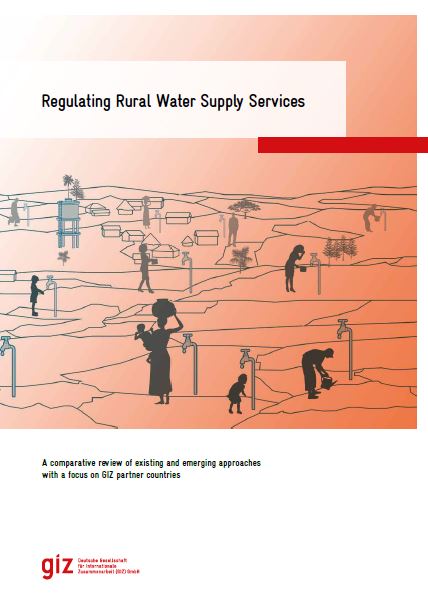Regulating Rural Water Supply Services
 |
rapport Aug 2019 ; 52 pages
Aut.
Ed. GIZ - Eschborn
Téléchargeable sous format: PdF
Téléchargeable chez l'éditeur
Site internet: https://www.worldwaterweek.org/event/8345-where-the-regulator-hits-the-road---rural-water-supply
Abstract:
This study responds to calls within GIZ to extend its considerable expertise in pro-poor regulation, which to date has largely centred on improving access to water services in urban low-income areas. Rights-based global commitments to addressing the persistent access gap between urban and rural areas have prompted a fresh look at the potential role of regulation. Guided by a review of the literature and expert insights, this study examines eight country case studies to explore the question of regulatory oversight for rural water supply services in the context of widely pledged universal service aspirations. Regulation is deliberately interpreted as a set of functions and competencies and a dynamic process involving providers and consumers as active participants.
Overall, the research corroborates the previously reported findings that working regulatory frameworks for rural water supply have yet to be fully developed; few existing sector regulators have an explicit responsibility to oversee and/or facilitate rural service extension and improvements. A sustainable and realistic approach to ‘leaving no one behind’ requires both imagination and pragmatism, akin to the service differentiation that has been successfully promoted in urban areas. ‘Performance monitoring plus’ is proposed as the most promising approximation to rural water services regulation, where positive advisory support is offered alongside the indispensable monitoring of services.
Embedding regulation in an enabling sector framework and securing political support will always be an incremental process. The case studies confirm that regulatory design can start with relatively simple mechanisms. These can gradually evolve into providers being held to account in more ‘conventional’ ways as the rural system – and the regulatory process – transition towards a greater level of professionalisation. Some creative solutions to the problem of finding flexible, low-cost strategies to extending regulatory oversight to the local level are worth taking note of: STEFI, the Malian independent auditors, COR ALs, the Mozambican mechanism for local proxy regulation, and the Brazilian rural services management model SISAR, which is entirely self-regulated but manifestly sustainable.
The study concludes with recommendations for further discussion, including widening the scope of research. The challenge of regulating small-scale water supply and sanitation systems to ensure safe service provision is by no means confined to the developing world. As regulatory mandates are becoming increasingly framed by universal rights, valid questions arise regarding priorities and allocation of responsibilities in the water sector. The findings support the notion of using technology and management models rather than the conventional rural-urban divide as starting points for creating countrywide regulatory frameworks. Water service regulators increasingly look to shore up system resilience and long-term security of supply, both of which are challenged by wider environmental trends, notably climate change. There is also strong evidence that non-networked services or self-supply, often heavily reliant on groundwater, can be expected to remain a common feature of rural water supply landscapes. Both lend weight to calls for greater institutional integration of economic, quality and environmental aspects of water regulation.
Mots clefs: |
eau potable (CI) (DT) (OP) (ope) , législation, lois (CI) (DT) (OP) (ope) , maintenance, entretien (CI) (DT) (OP) (ope) , mode de gestion/gouvernance (CI) (DT) (OP) (ope) , rural (CI) (DT) (OP) (ope) |
Pays concernés: |
Bénin (CI) (DT) (OP) , Brésil (CI) (DT) (OP) , Burundi (CI) (DT) (OP) , Inde (CI) (DT) (OP) , Kenya (CI) (DT) (OP) , Mali (CI) (DT) (OP) , Mozambique (CI) (DT) (OP) , Zambie (CI) (DT) (OP) |
Editeur/Diffuseur: |
|
GIZ
-
Deutsche Gesellschaft für Internationale Zusammenarbeit - Eschborn - Allemagne |
En cas de lien brisé, nous le mentionner à communication@pseau.org